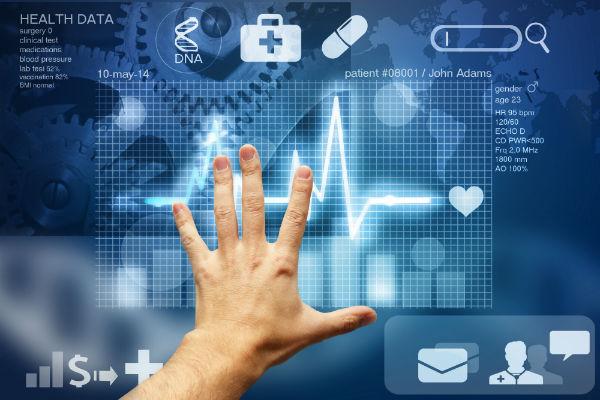Digitization of Healthcare in India: Amazing Services You Can Look Forward To
Author: Guneet Bhatia | December 13th, 2017

The digitalization of services is one trending phenomenon that has impacted different industrial sectors in almost all the popular states of India. The healthcare industry in India is no different. Several advances in terms of the use of technology have been made so far, marking a drastic shift in how healthcare services are now delivered to patients.
Digitization in healthcare is not a new trend. Years have passed since the best hospitals in India started to maintain electronic health records (EHR) and use hospital information system (HIS) to create a database or a pool of information available to authorized personnel and patients.
From technology-controlled centralized oxygen supply to high-tech operation theatres and catheterization labs, digitization has affected every aspect of healthcare. As far as the future is concerned, the role of IT in health sector is expected to further delve deep into the roots of delivery models used to provide quality healthcare services to patients.
The Impact of Digital Revolution So Far
Gone are the days when patients had to seek an appointment personally at the hospital to see a doctor. Now the patients and their families are empowered with different tools to book an appointment online, call or send a message to their physician on Whatsapp, and share their reports over email.
According to a survey, different healthcare providers in India spent approximately $1.2 billion on IT services and products in 2016 alone. A large portion of this huge amount went into the purchase of IT and telecom services, data center systems, software, and other internal services.
Thanks to digitization in healthcare, the mortality rate and average life expectancy have tremendously improved in the last two decades. Medical technology has changed so much that now it is possible to treat a myriad of serious health problems, even the ones that were once considered incurable.
The digital revolution in healthcare has not only improved the lives of the patients but also improved the efficiency of the hospital staff. Since most of the records at private hospitals are now maintained electronically, a doctor no longer has to do the paperwork and instead can focus on spending additional time with the patient.
The Future Role of IT in Health Sector
The digitization in healthcare is an on-going thing that will continue to take place years into the future. The idea of wearing a wristwatch that stores your vital signs such as heart rate and blood pressure all the time may seem a bit weird today but this is exactly how the healthcare is expected to work out in the future.
The following are some of the high-end technology and services that you can expect to be integrated into the healthcare delivery system used across different hospitals in the country:
Dietary management apps: There are plenty of healthcare apps already available for Android and iOS users that recommends a dietary plan for patients according to their age, weight, and medical condition. Several studies indicate that people in Asia are more open to the use of virtual assistants and health coaches that can help deliver services to them remotely. Who would not like someone guiding them through mobile apps while they remain in the comfort of their homes? The hospitals in India are expected to promote the use of such apps for strict diet control, educational awareness, and more.
Wearable devices and implants: Ever heard of an implant or a wearable device that can observe your vital signs around the clock and send the data to the doctor directly without you visiting a hospital? A FitBit would become a thing of the past soon with the invention of wearable technology, implants, and pills that monitor your health and suggest you ways to improve it.
Non-invasive and painless tests: A painless and non-invasive blood sugar monitoring device is already available in the UK. Soon, such technology is expected to rule the Indian healthcare market because it empowers people to manage their own health without any fear. Self-monitoring devices are on demand more than ever and a lot of variations with respect to device technology are expected to take place in the future.
Medical tourism: Everyone likes to seek affordable and quality healthcare, Earlier people had limited options to approach to seek treatment. Now with the booming medical tourism industry, a patient in one state of India can choose to seek treatment in another state or even abroad with the help of a medical tourism facilitator in the country. Medical tourism companies in India have empowered people with all the knowledge and resources that they need to make sure that they get the best treatment at a cost that they can afford.
Robotic surgery: Many hospitals across the length and breadth of the country have already installed robotic systems to conduct minimally invasive surgeries. This technology is further expected to expand and enhanced with multiple other features that will help deliver the best treatment experience to the patients.
Medical technology: Not many of you may have heard of a diagnostic procedure called standing MRIs. It is a variation of the standards MRI procedure that allows for detection of even the minutest problems that may go undetected. High-end technology and tools such as Novalis Tx for radiosurgery and radiotherapies, TrueBeam STX for cancer treatment, 320 Slice CT Scanner for a full body scan, and optical coherence tomography for visualization of heart’s blood vessels from the inside are expected to become commonly available.
Decentralized health records: Even though there is still a lot to go when it comes to decentralization of electronic health records, there will be a day when patients would no longer have to carry their reports everywhere while approaching a physician anywhere in the world. All the information will be available in a repository online and will be made accessible to doctors, patients, and other healthcare professionals as and when required.
Challenges Ahead
So far, digital health has successfully managed to address some amount of the three most common challenges associated with healthcare delivery – high costs, poor coordination services, and low awareness about chronic health problems such as alcoholism, diabetes, obesity, and smoking. But there is still a long way to go when it comes to complete and optimum use of the available digital health services.
Even though an increasingly large number of people in India are now comfortable using mobile applications and using the internet to search for information, a large majority from the two-tier and three-tier cities still do not have adequate skills and resources to reap the maximum benefits. Some of the unique challenges associated with infrastructure and demographics will continue to exist unless something is done to create new healthcare models that help bridge this gap.
Author Bio
I am a freelance medical and health blogger. I have worked with carious clients from across the globe and have had my work published in few international publications like International Business Times in US and Australia.For complete details about my work please visit my blogger profile. I also devote substantial amount of time to social causes like physical and psychological health counselling to young children. I am a recycling enthusiast who believes recycling waste is a way to keep the planet healthy.
Email: emailtoguneetb@gmail.com
Blogger Profile: healthosaurus.wordpress.com/about/
Google+ profile: https://plus.google.com/u/0/+GuneetBhatia66*****





.jpg)



